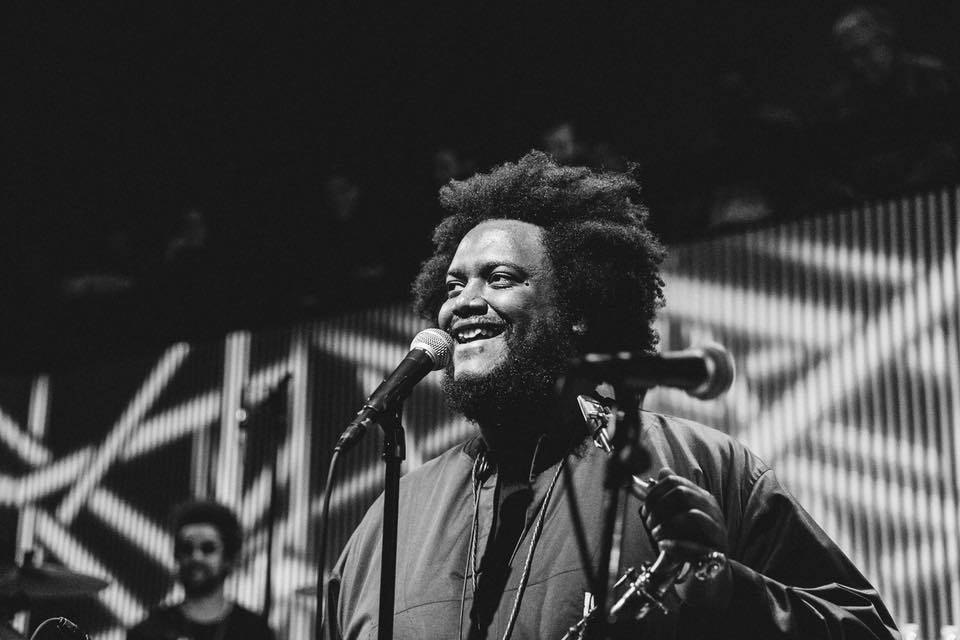Kamasi Washington is no doubt an amazing saxophonist — listening to The Epic for the first time you’ll find yourself lost in the album, even with the album coming in at almost three hours. It is a very appropiately named album.
He recently released an EP, which was much shorter, called Harmony of Difference it is an amazing EP that builds upon itself and ends on a song called “Truth”, which brings together the concepts and ideas from the first five songs.
We sat down to talk to him ahead of his show at the Canopy Club on Tuesday, November 14th.
Smile Politely: So can you tell me about yourself?
Kamasi Washington: I’m Kamasi Washington, I’m a saxophone player from L.A.. Second generation musician, I’ve been playin since I was 3 years old. Spent a lot of time playing with different artists like: Stanley Clarke, Lauryn Hill, Snoop, Kendrick Lamar and in 2015 I put out an album called The Epic and I’ve been focused on doing my own thing since then.
SP: Were you playing saxophone at the age of 3?
Washington: No, I started off on drums, then piano, then clarinet. When I was about 11 is when I really got into jazz, Wayne Shorter was my favorite musician and he was a saxophone player, so I wanted to switch to saxophone, but my dad he was also a saxophone player and he wouldn’t let me.
He wanted me to get better at clarinet first, so one day I snuck into his room and took his saxophone and I learned how to play this one Wayne Shorter song and showed him and said “it’s too late I already know how to play the saxophone” [laughs]. He then went ahead and let me go on my journey.
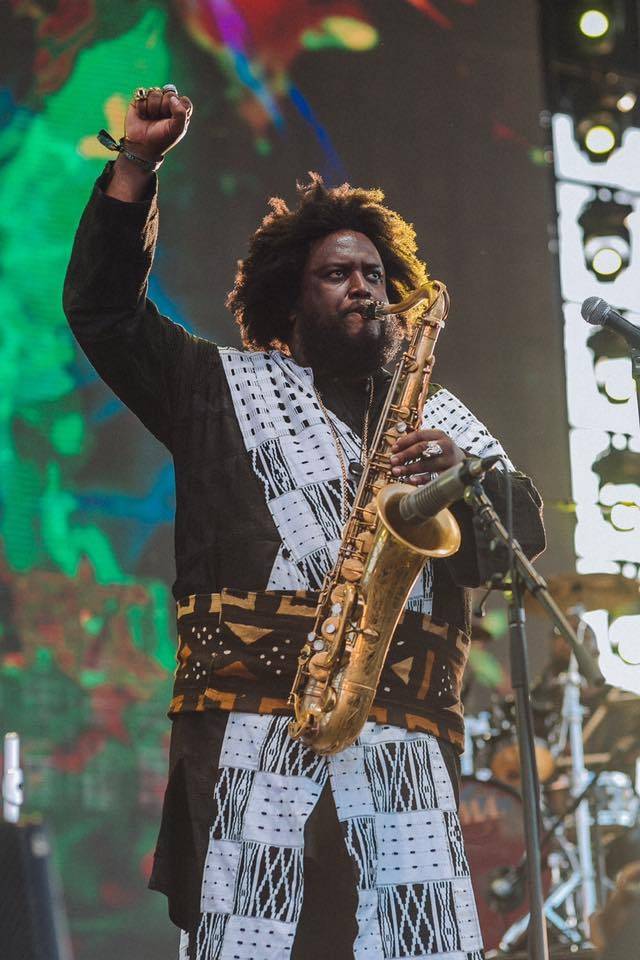
SP: That’s pretty awesome, so you’re self taught at the saxophone or you got lessons?
Washington: My dad was a saxophone player so I was taking lessons from him. I went to a high school that was for kids who wanted to be musicians and then went to UCLA to study ethnomusicology. I studied people and learned a lot, but I feel like music is always a bit self-taught. You can’t really teach someone music, you can only show them how to teach themselves.
SP: What is the song writing process for you like?
Washington: It varies, my most common way of writing songs is I wait for some spark or seed to come to me and it could be a melody, part of a melody, a chord, or a series of chord changes, or rhythm giving me an idea or a concept and then I develop it and keep adding to it until I feel like it’s full and then I try to let go. [laughs]
SP: Andrew Bird has a similar problem where he doesn’t know when to end a song and feels like it’s never finished.
Washington: I mean the reality of that is you can always keep fine tuning it, but at a certain point you’ve got to realize that you’re not necessarily making it better or worse, you’re just changing it and at that point you’ve just got to let it go and let it exist.
SP: So then are there differences in the way you perform The Epic live now, as opposed to what’s on the album?
Washington: Oh yeah! We play it differently every night, I try and let the music exist in the time and space that it is in. You know what I mean? It’s where we are. Also, with what the musicians are playing, so the music changes all the time. The core of the song is always there, but the tempo, the key, the feel, the style all those things change all the time.
The spirit of the song is always there, it can exist in so many different ways. Songs are ideas, they can exist in many forms. The songs are never finished, they change every night.
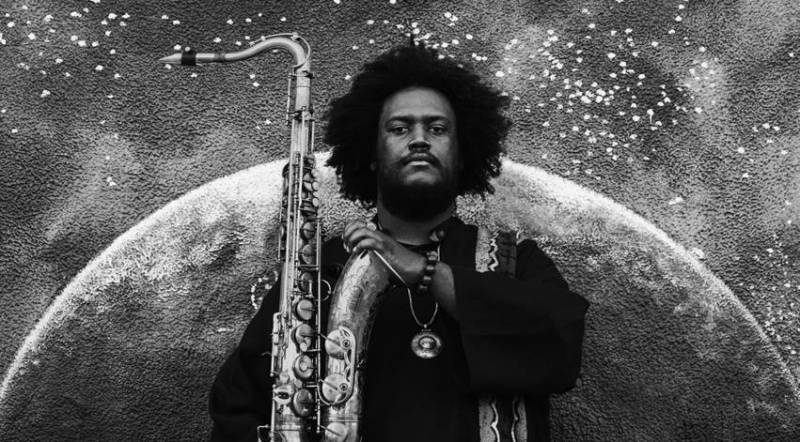
SP: There’s never going to be a finally version of the songs?
Washington: I feel like the record version if the definitive version, but you know every day has different energy so the song may take on a different light.
SP: In noting the differences between The Epic and Harmony in Difference, in The Epic the shortest song was like 6 and a half minutes, but in Harmony of Difference the longest song before “Truth”, which is 13 minutes, is about 4 and a half minutes. What was the process for you there? What made the songs shorter?
Washington: Well Harmony of Difference I originally wrote to be a part of an exhibit for Whitney Biennial and I wasn’t intending to make it an album that I release. My original ideas for it is that it is one piece of music. It’s a six-part suite that are very much interrelated to one another.
The first parts are shorter, because they’re connected to the last part. The idea of it was that I wanted to do something to celebrate diversity. I’m from Los Angeles the most beautiful thing about my city is that, it’s so full of diversity; there are so many different people.
So many different: thought processes, languages, cultures. There was all this negative energy going out with respect to that and I wanted to do something that was a counter-balance to that. The idea of “Harmony of Difference” is that I was going to use the concept of counter-point as a metaphor for togetherness.
I set off to write five songs that interact with each other in a way that melodic figures interact with each other in counter-point. The individual tracks are shorter, because they’re leading up to truth where we play all five songs at the same time.
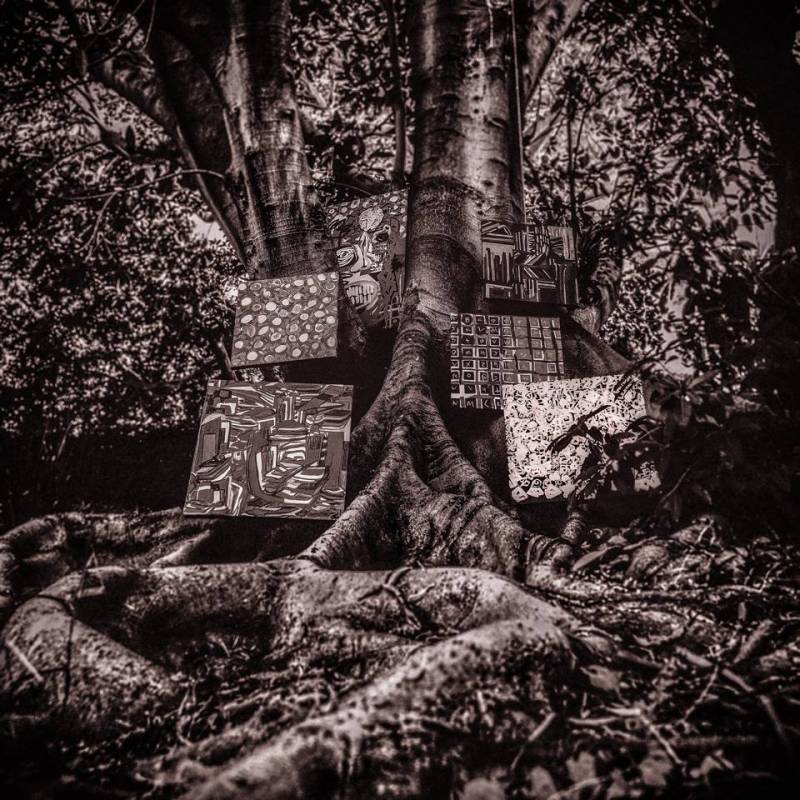
SP: Would you say that talking about where our similarities are, is what inspired the album?
Washington: Yeah, it felt like there was a beautiful bed of flowers and someone comes along and says that they’re weeds and they want to cut them out and you’re like “Nah they’re beautiful” and you just have a shovel. It’s like “Look! Look at them they’re beautiful you don’t need to cut them out.”
That was kind of the sentiment of it, our diversity our differences, the vastness of our approaches to life are a good thing. We don’t all need to think the same thing or be the same way. It’s what makes the world beautiful, the vastness of our approaches and perspectives.
SP: Speaking a bit about that you had one collaboration that I was super excited about, the one with Ibeyi.
Washington: Oh yeah! We met at Bonnaroo last year and we were on the same stage and we heard their set and were just blown away. Then after that we just sort of kept running into each other at shows. We started admiring each others music and when they were working on a new project, they asked me if I was down to add something to deathless. I was honored, they’re so talented.
The song worked well for my own musical disposition and it was a lot of fun.
SP: You’ve had a few other collaborations as well, I think most notably with Kendrick Lamar on To Pimp a Butterfly, how did that come to be?
Washington: I’m a good friend of Terrace Martin, that I grew up with. He had been telling me about Kendrick since like 2006. I had been an admirer of his music for a long time. I was actually working on an album for Terrace called Velvet Portraits, at that point The Epic was already finished, it hadn’t come out, but it was done.
Terrace had heard about it and I let him hear it. When he heard the strings and the choir, he asked me “Who did those arrangements?” and I told him “I did those arrangements” and he asked me to come in and do some orchestral arrangement for Kendrick. I didn’t know what to expect, or what they were working on.
They were probably 70% done with the album when I came in, they originally wanted me to add like a film score to the final song where Kendrick was interviewing Tupac, but to really understand that part where he was talking to Tupac you had to listen to the whole album.
Myself, Terrace, Thundercat and Sound Waves, we all sat and listened to the whole album four times in a row and every time we’d listen to the album there’d be another song that they wanted me to work on. So that is how I ended up being on that album.
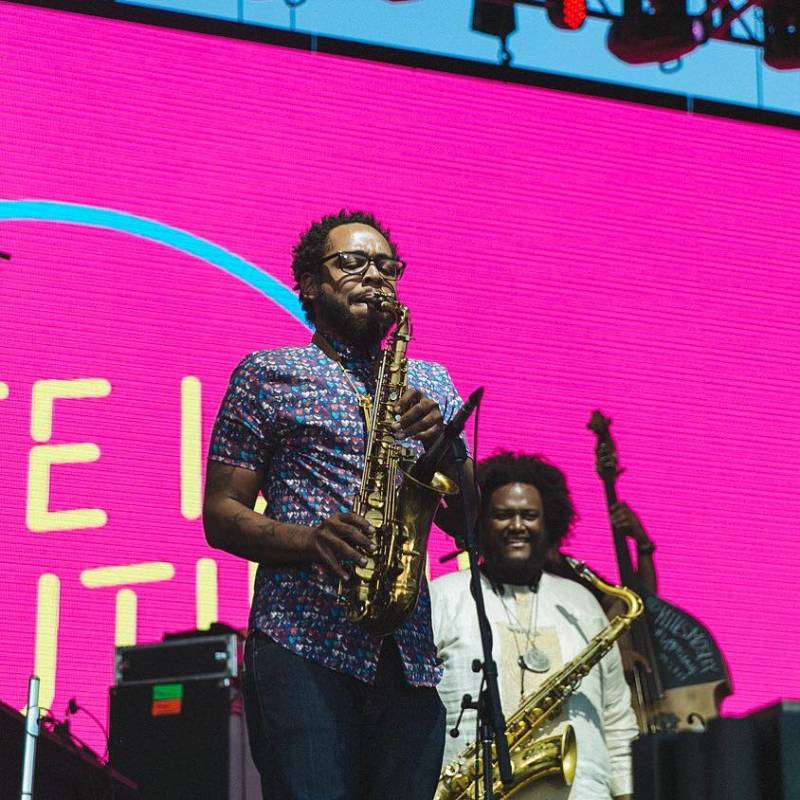
SP: Yeah a song, is never done right?
Washington: Haha, that’s exactly what it was!
SP: I accidently let part of that interview with Tupac play once at a show.
Washington: Hah, I was freaked out, I was like ‘Is Tupac still alive?! Are you revealing that Tupac is still alive?!”
SP: Maybe he will featured on the next Ibeyi album.
Washington: Hah! Oh yeah.
SP: I think that albums like To Pimp A Butterfly brought jazz around to the public and at the same time I also read around that you’ve had some part of making jazz cool again. Whenever I’m listening to your music I feel like it’s very explorative and doesn’t sit in one place, but it’s still so cohesive and powerfully done. What I want to know, is what are you thinking about when you play?
Washington: You know, music is the ultimate form of self-expression. As a musician, I’m always trying to reach inward to then push out. I’m usually trying to tap into myself and it’s the most difficult thing to know. It’s like trying to hear the voice in your head.
For me it’s that, the music just kind of flows into you and you have to tap into it. So I’m usually doing that, trying to find a way to tap into it. That’s usually why I’m doing the changes every night, it comes in a different way. To really play music, I have to tap into it and I have to find it and give into it.
You practice so much and you have a skill set that then kind of have to let go of and find the music and give to the people who are listening. It’s like give in and then push.
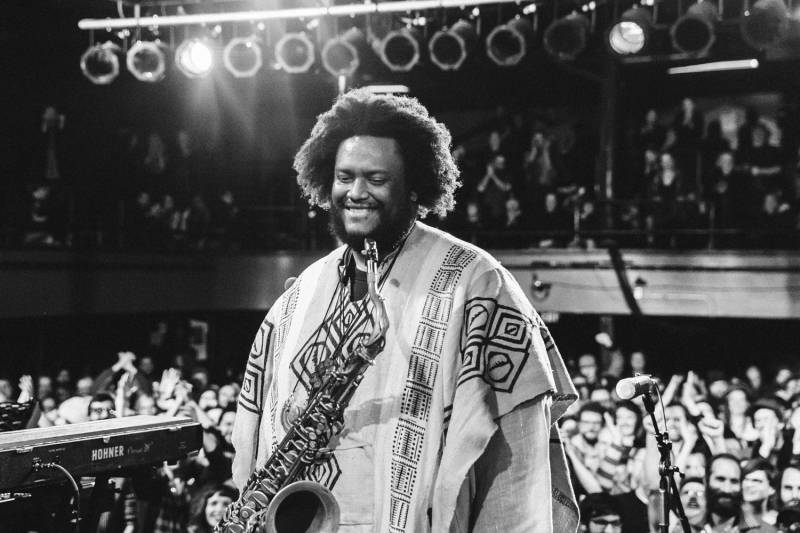
SP: Every night then is kind of a form of self-analysis based on how the city, the venue or the people are making you feel?
Washington: Hmm, it’s more like you kind of have to find the music that is in that room. It’s like the city, the venue and the people all create a vibe and then as a musician you’re searching for that. It’s hard to explain, but it’s kind of like there’s an energy in the room and you have to find it and not fight it, but for me I’m always searching for it. I find it and then go from there and I am on the same journey that the audience is on, we’re all just tuning into it.
SP: What are some of the difficulties that you face while touring?
Washington: Probably the most difficult thing about touring is time. It’s such a morning to night schedule and you have to find time to do things like catching the vibe, connecting with people, get a feel for where I am at and at the same time doing sound check. There’s also regular stuff like showering, folding clothes and getting your bags together, you know what I mean?
That’s the most difficult part about touring, it’s a fun life, but it’s definitely a full life. [laughter]
SP: When you get back home it’s nice and relaxing, but you still have that feeling of wanting to play music.
Washington: Yeah, yeah. When you get home it’s like you’re in a comfortable space that you know and all the regular stuff is so much easier. On tour it’s so much more difficult you have to stop and figure out what you’re doing and where you’re going to eat.
SP: What’s been your favorite spot to be in?
Washington: That’s always a hard question, because every spot is different. We were in Brazil earlier this year and that was amazing, it’s always amazing. New York is always fun, there is always so much going on there. It’s hard to say, because you got New Orleans too and the food and I don’t know, just good times every where. They’re all my favorite! Earth! That’s my favorite spot.
SP: Hah, yeah! Venus and mars just aren’t as fun, but Earth…
Washington: Yeah, Earth is where it’s at!
Be sure to check out his show at the Canopy Club on Tuesday November 14th.
All photos from Facebook.








